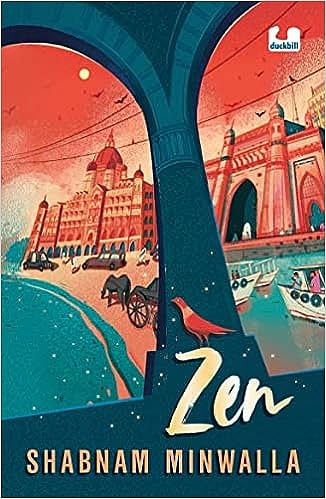
Lives of Zainab Currimji — affectionately called Zen — of 2019 pre-Covid Mumbai and Zainab Essaji of 1935 pre-Independence Bombay cross paths in Minwalla’s latest to create a potpourri of history, heritage, and culture and the fight to preserve them.
Zen, a 17-year-old, is bright but introverted; and invested in the looming CAA — Citizenship (Amendment) Act — debate and protest, along with other concerns natural to high schoolers. Zainab, a 19-year-old, soon-to-be-married, jazz, romance novels and embroidery-loving, reflective girl is entangled in her own ways. Between weddings at home and relatives who prefer assuming rather than asking before making judgements, they both find the love they fear, challenge the ways of the world and have friends to keep their secrets safe (a secret diary, in Zainab’s case). As one navigates the decades between them, the longing and yearning for love, the rage and revolution of youth, and the power and value of family come alive on paper. The bonds of friendship and kinship find a place in Zainabs’ lives and ours — for we know the people Minwalla writes of, intimately.
The narration (and narrators) of the story shifts from third-person accounts to diary entries, texts to newspaper clippings, which makes Minwalla’s writing notably interactive. It is hard to find a book that offers as much as Zen does: it has family drama, romance, and political conscience. It is at once historic and futuristic — something that is rare to experience in the linear world we exist in. Music, or more so, the lyrics of old and new songs — from jazz to Bollywood to Christmas songs — plays a key role in directing the story of the two Zainabs. As do maxims and quotes. Take for example a quote from the famous Robert Frost poem, The Secret Sits: “We dance round in a ring and suppose/but the secret sits in the middle and knows”. To celebrate the meaning music gives to the story, the publishers have also created a playlist on Spotify by the name of the book.
Shabnam Minwalla — journalist and writer — comes from a family of Bohra Muslims, Parsis, Tamil Brahmins and Bengalis. Known for her grip on young adult novels and historical nonfiction, Zen is both a personal and professional feat for her; a reward for three years of thorough research on the global political climate of then and now, the past and present of Bombay’s cotton and dye industry as well as the infrastructure and food of the city. It is not just the young minds that have a lot to take away from Zen, but even the common man of today — either drunk with ignorance or ready to attack anyone who contradicts his idea of a nation — will be compelled to think and seek answers to forgotten questions. Especially those hellbent on the singularity of Indianness will find insight in Zen and Zainab’s story and hopefully learn a lesson they repeat: “Being Indian is not just about history. It’s as much about geography.”
While Zen, at first glance, is a story of what it is like to be a teenager and in love, it is also the story of what it is like to be on the brink of making history; of what defines us in the presence (and practice) of one religion or the absence of another; of how we treat those around us and how we are treated in return. Shabnam Minwalla has captured the essence of this exchange light-heartedly but skilfully.
Zen is the antidote to the offence we wear on our sleeves and the words we carry like bullets in our pockets. It teaches us the dying art of tolerance, and yet, makes for a breezy vacation companion. Don’t let the size deter you.